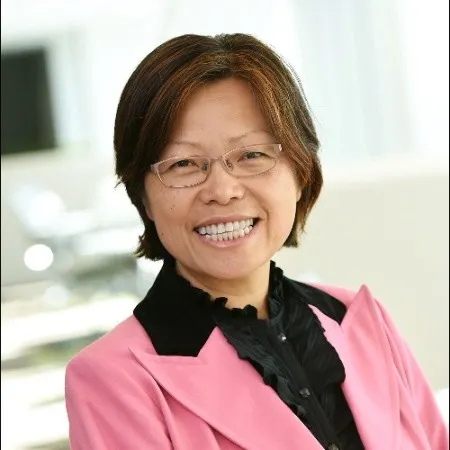Christina Ho has built a career defined by data, technology and reform. And now, as one of four members of the Public Company Accounting Oversight Board, she says her team must catch up to the speed of the business world it oversees.
Ho has had a front-row seat to financial transformation in the context of accounting in particular. Before joining the oversight board in 2021, Ho led financial transparency initiatives at the U.S. Treasury, where she helped implement the first federal open-data law requiring more than 100 agencies to publish standardized financial information. She later served as interim CFO at the University of Maryland and led analytics work for Elder Research. Earlier in her career, she audited large institutions at Deloitte.
That path now shapes how she views the PCAOB’s role at a time when AI in multiple forms is transforming the profession. Ho is now urging her fellow regulators to help auditors and companies innovate responsibly rather than fall behind, as she claims they previously were. As chair of the PCAOB’s Technology Innovation Alliance Working Group, she led a two-year effort that produced recommendations on how the board could modernize audit oversight through AI and advanced analytics — work that, under former chair Erica Williams, she said fell through the cracks and was never released.
A call for urgency
Ho said her advocacy for technology began the moment she joined the board. “I actually have been an advocate for technology since the day I became a board member,” she said. “If you trace back to my first speech, I was talking about the future of auditing. I talked about technology and talent being the key audit quality factors for the 21st century.”
When asked about what changed inside the PCAOB and its technology initiative, Ho, who emphasized that her views are her own and not those of the full PCAOB or its staff, pointed directly to leadership. “At a recent speech I gave, I spoke about the change inside the PCAOB. It wasn’t anything I changed; it was the fact that Erica Williams left,” she said.
“We have a new leadership at the SEC and at the PCAOB that is more open to technology innovation,” she said. “Because under Erica Williams, even though we’ve had these great recommendations from the working group, she chose not to publish it.”
“It’s true that AI can replace work— no question — if anybody’s trying to be politically correct and say, ‘Oh no, it’s not going to get rid of any job,’ that’s wrong. It will definitely have impacts on entry-level jobs.”

Christina Ho
Board member, PCAOB
Ho pointed to a recently published pair of reports her working group authored that outlined a framework for how the board could modernize audit oversight through responsible AI use, data governance and an innovation lab to test emerging tools. The reports were authored in August 2023 and May 2024 but were never released publicly until September of this year.
“Before the full potential of these technologies can be unlocked at scale, however, a foundation for adopting technology must be created – including taking steps such as developing trust in AI-based audit procedures, adopting cybersecurity measures for cloud-based and virtual environments, and standardizing data,” the working group’s May 2024 report said.
Ho argued the reports should have been released much earlier, and hinted they were held back due to too much skepticism under Williams’ leadership around technology and its risks. “Under the new leadership, we will move forward with it,” Ho said. “But thankfully, these recommendations, even though it’s been over a year, are still highly relevant, which shows the quality of the recommendation and also really the advancement of technology in the past 15 months.”
She stressed that the delay mattered. “If you think about the advancement of AI in the past 15 months, there has been a significant explosion,” she said. “I believe that AI is evolving from an emerging technology to a real infrastructure that requires governing. So I think it’s important to be responsible and to be cautious, but it is not good to let our fear hold us back from a regulator perspective.”
AI’s promise and the profession’s challenge
Ho said she uses AI herself and understands how quickly it is changing the work accountants do. “I am an avid user of AI in even my own personal life, so I am very familiar with its capability and potential,” she said. “So it’s true that AI can replace work— no question — if anybody’s trying to be politically correct and say, ‘Oh no, it’s not going to get rid of any job,’ that’s wrong. It will definitely have impacts on entry-level jobs.”

That is why, she said, technology education must become a core skill for accountants and auditors. “That’s why the last pillar of the [Technology, Innovation and Emerging Risks] recommendation is about how to increase the technology literacy of accountants and auditors,” she said. “At some point, technology should be something that should be considered as a basic competency that auditors should have.”
With this context, however, she also added that the next generation of auditors should not see AI as a threat but as an opportunity. “I am very optimistic about the future of what I would call assurance professionals, including the students,” she said. “Instead of being in despair, they should view it as [an opportunity], because I find that young people are already more technology savvy and more open to using technology.”
That adaptability, she said, will create new kinds of work. “I think accounting is set to become an emerging area that’s going to need a lot of assurance practitioners,” she said. “I think the need for AI assurance is going to skyrocket, because we’ve got all these AI tools, but if people don’t trust it, they’re not going to use it.”
Her own use of AI has already replaced tasks she once delegated. “I just am amazed how quick and how good these models are,” Ho said. “These tools are able to provide me things that I might ask a first-year year to do that could have taken two weeks, and I could do it myself within a matter of 10 hours,” she said. “That’s using a subscription of $20 per month.”
That kind of change, she said, will force the profession to expand its definition of value. “The way to think about the future of this profession is to think big about how to expand the assurance space,” she said. “If we think in terms of the current sort of space, then yes, those looking for careers in accounting should be concerned.”
Auditing, she added, still depends on human courage and integrity. “When you think about auditing, it’s one of those few professions where you’re put in a position that you have to speak the truth when necessary, even though your instinct of self-preservation might prevent you from doing that,” she said. “It is a profession of trust, and that is something AI can’t replicate just yet.”
The need for one regulator and one standard
Ho said structural reform is also needed to strengthen the relationship between CFOs and auditors. When asked about how CFOs can play a role in creating a stronger relationship with their auditors, Ho said there’s only so much a finance leader can do in the current regulatory structure. “It would be much easier for everyone if the CFO and the auditor have the same regulator,” she said.
She explained why the current split between the SEC and PCAOB can create confusion. “We have SEC over the issuer of their financial disclosure, and then we have PCAOB regulating the audit,” she said. “You really cannot assess audit quality outside of the context of the financial disclosure.”
That separation, she said, sometimes leads to conflicting results. “There have been times when audit firms are given a deficiency about an incorrect application of GAAP,” she said. “But the issuer might have cleared that with the SEC accounting, and then the auditor might agree with the interpretation and application of GAAP, but when PCAOB inspectors inspected, we think that application is incorrect.”
The result, she said, is confusion for both sides. “You could end up in a situation where the CFO and the auditor are answering to different standards, and that creates problems,” she said. “In order to answer your question, I believe we can only solve for that answer when the CFO and the auditor have the same regulator.”
When asked about former SEC Commissioner Paul Atkins’ belief that the PCAOB should be folded into the SEC, Ho did not hesitate. “Yes, I actually publicly have supported that,” she said.
Ho said the change would make regulation more consistent and transparent for everyone involved. “I don’t think that is in the best interest of the investor, because the investor might see that we brought up a deficiency and said you didn’t apply GAAP in this particular area,” she said. “But the story is not complete, because the issuer may believe they applied GAAP correctly.”
For Ho, the solution is simple: coordination, clarity and a bit of courage to make change. “When the CFO and the auditor have the same regulator, we can finally close that gap,” she said.





